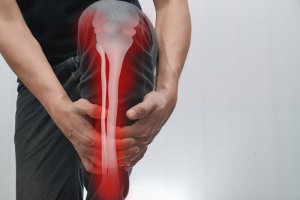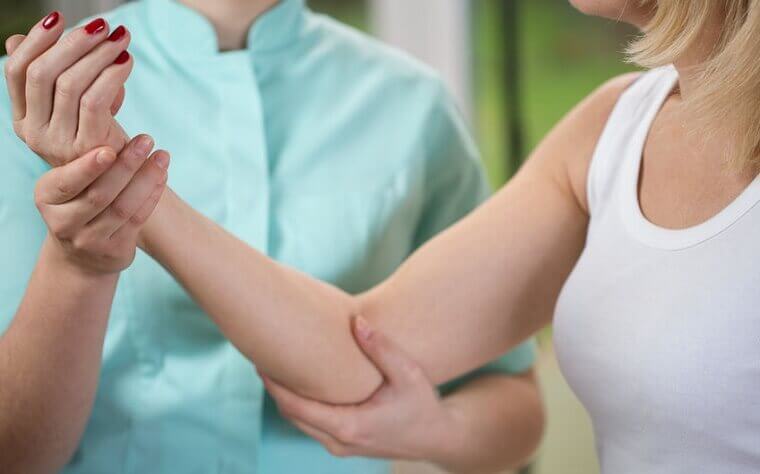Bone Pain: Causes, Symptoms and Treatment

Bone and joint pain has a few causes. Therefore, it’s important to know how to prevent it and treat it so it doesn’t affect your everyday life.
Bone pain can happen from several reasons, such as arthritis, osteoporosis, nutrient deficiency from an unbalanced diet, physical activities, injuries, etc. With proper treatment, you can combat this pain without having to completely change your lifestyle.
Actually, bone pain is becoming more common and can appear at any age. It usually affects women more than men, depending on the intensity, it can make daily activities difficult. Bone pain can be intense or chronic. It’s important to pay attention to this condition in order to identify what type of pain you have.
- Intense bone pain: This type happens suddenly. Generally, it’s a consequence of a sudden movement or jerk. It can show up after working out or from a back or muscle injury.
- Chronic bone pain: Unlike intense pain, chronic pain takes place repetitively and constantly. It can happen for many reasons, which you can read below.

Causes of Bone Pain
Some of the common causes of bone pain are caused by osteoarthritis and sprains or fractures.
There are risk factors that increase your chances of having joint pain, such as:
- Joint damage, due to the conditions mentioned above or surgeries.
- Genetic predisposition.
- Anatomical structure.
- Obesity (in this case the joints are exposed to excessive pressure).
Read this article too:
6 Facts You Should Know About Osteoporosis
Symptoms
Bone pain affects different areas of your body, like your fingers and toes, wrists or knees. It’s usually linked to stiffness and throbbing pain. Joint pain, arthritis or osteoarthritis can be accompanied by inflammation and can show up in different ways.
In osteoarthritis, your joint cartilage becomes weaker and its ability to regenerate is limited, which causes cartilage loss over time. As a result, the unprotected bones grind against each other and make it difficult for the bones to move.
What Natural Remedies Help Treat Joint Pain?

Oranges
Oranges, a rich source in vitamin C, are ideal to prevent inflammation. Additionally, these fruits contain beta-criptoxanthin antioxidants that help reduce your risk of developing rheumatoid arthritis.
Application
- Eating 1 or 2 oranges every day is a great idea.
- Drink natural orange juice, before breakfast, to improve your bone health.
Horsetail
The horsetail plant has a lot of minerals such as aluminum, iron oxide, potassium and magnesium. They help protect your connective tissue.
Their diuretic properties can also help reduce the pain from certain joint conditions. This plant has organic compounds that have the ability to re-mineralize bones and naturally reduce swelling.
Ingredients
- 1 tablespoon of horsetail leaves (15g)
- 1 cup of water (250 ml)
Instructions
- Heat the water with the horsetail in it and bring it to a boil.
- When it comes to a boil, remove it from heat and let it sit for 5 or 7 minutes.
- Once the time is up, pour it into a cup and drink it. It is important to drink this tea twice a day.
Eat Fish
Another way to combat bone pain and joint inflammation is by consuming omega 3 fatty acids. To get it, it’s important to eat more fish such as:
- Salmon
- Trout
- Tuna
Check out this article too:
Try These Delicious Fish Fillet Recipes
Rosemary Alcohol for Bone Pain
The great anti-inflammatory properties of rosemary alcohol make an ideal remedy to calm joint pain. It’s especially useful for people that have arthritis or osteoarthritis.
Ingredients
- 1 tablespoon of rosemary (15g)
- 1 bottle of isopropyl alcohol (250 ml)
Instructions
- Add the rosemary leaves to the alcohol bottle and let it soak for 48 hours.
Use
- When your bones or joints hurt, apply a little of this rosemary alcohol with gentle massages.
- You can apply it a few times throughout the day.
In addition to the remedies mentioned above, it’s very important to live a healthy lifestyle. It’s important to follow a balanced diet that’s rich in fruits and vegetables, take long walks, and avoid drinking alcohol and smoking cigarettes.
This text is provided for informational purposes only and does not replace consultation with a professional. If in doubt, consult your specialist.








